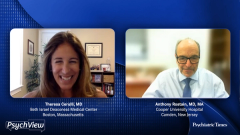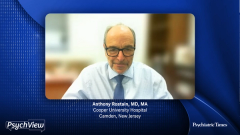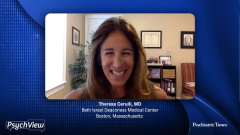
Recent Spikes in Adult ADHD Diagnoses
Theresa Cerulli, MD, and Anthony Rostain, MD, MA, discuss the recent spike of adult attention-deficit/hyperactivity disorder (ADHD) diagnoses and how this has been impacted by COVID-19 and telehealth.
Episodes in this series

Theresa Cerulli, MD: Hello and thank you for joining this Psychiatric Times® PsychView presentation, “Novel Delivery System Utilized in the Treatment of Adult ADHD.” I'm Dr Theresa Cerulli. I'm a neuropsychiatrist practicing at Beth Israel Deaconess Medical Center in Boston, Massachusetts and in my private group practice, Cerulli and Associates in North Andover, Massachusetts, specializing in ADHD [attention-deficit/hyperactivity disorder] for over 20 years. I see kids, adolescents, and adults. I'm joined today by Dr Tony Rostain. Dr Rostain, please tell us about yourself.
Anthony Rostain, MD, MA: Hi, great to be here. Currently, I'm the chairman and chief of psychiatry and behavioral health at Cooper University Health Care and Cooper Medical School of Rowan University in Camden, New Jersey. I spent 40 years at the University of Pennsylvania in Philadelphia, Pennsylvania, including the children's hospital. I moved into Emeritus, and I founded both a child ADHD program and also an adult ADHD program at CHOP [Children’s Hospital of Philadelphia] and at the University of Pennsylvania respectively, and I’m still very active as the past president of the American Professional Society of ADHD and Related Disorders.
Theresa Cerulli, MD: So great to see you Dr Rostain, a pleasure to see you. You've done so much for the field of ADHD and I’m really looking forward to this discussion, so let's begin.
Thinking broadly, first can you briefly discuss the recent spike in attention-deficit/hyperactivity disorder, ADHD?
Anthony Rostain, MD, MA: The good news is that our efforts to educate both the public and health professionals about the fact that ADHD exists in adults, I think this has become more and more recognized by a growing number of people. I also think ADHD symptoms really have an incredibly important impact on functioning in what we might call the digital environment or the digital world and trying to manage lots of things all at once. I think that if anything, ADHD has become more and more impairing as our society evolves to really require people to be able to start and self-start and do a variety of things on their own and not get off track. I guess social media in general has made it really easy for patients to learn more about ADHD. There are lots of people posting and teaching all the time so I think overall it's partly a greater recognition and also the fact that it's becoming more impairing in this modern world.
Theresa Cerulli, MD: So well said, greater awareness for doing a better job I think getting the word out, but also, as you said, life has become more and more challenging for us, so trying to keep track, organize, manage our time and have goal-directed behaviors with good attention is challenging everyone, but certainly our ADHD patients. Let's add, you mentioned the digital world, COVID-19. Where do we begin here talking about the pandemic?
Anthony Rostain, MD, MA: I think that COVID-19 may have led to a greater incidence of ADHD self-diagnosis. It may be because people are spending so much time on Zoom and working at home and finding it harder to function. The digital workplace is hard for many people with ADHD because normally it would be the environment that structures us and keeps us on task, so in familiar environments, but when you're at home and you've got all these other distractions and all the rest, I think that that was one factor.
I think the other is the disruption to just normal life that, again, required people to have to learn new routines and I think people with ADHD tend to have a little harder time getting routinized and then I guess, on the positive side, we could say that access to care via telehealth is easier. I actually think that the switch to telehealth has made it easier for people to get help.
Theresa Cerulli, MD: I'm curious, are you using telehealth as far as diagnosis and management of adult ADHD and if so, what role do you think that's playing in your practice?
Anthony Rostain, MD, MA: Obviously, we have to live within the regulations so it actually requires us, if we're going to use any kind of stimulant medication, for example, you can't just have never met the person in person. But I actually think that for my patients’ ADHD, once I've established a relationship with them and I'm convinced, and in the office, we've managed to ascertain that “Yes, indeed you have ADHD,” the follow-up visits are a lot better when they're on telehealth. People can literally stop what they're doing, check in with us, and get back to what they're doing. Many fewer no-shows for example, and much, much better adherence to the schedules.
Theresa Cerulli, MD: That's been my experience as well. The no-show rate has gone down. There's more accessibility, at least online.
Anthony Rostain, MD, MA: And it's also easier to then monitor treatment because I've begun to have just check-in visits that are briefer, but more frequent, because in the past you couldn't do that. People weren't going to travel to come to an appointment that's brief. But now you can do that especially when they're starting on medications, and you want to see how they're doing.
Theresa Cerulli, MD: I want to circle back to thinking about what we said with regard to the spike in adults' ADHD. How has perhaps telehealth played a role in that, and how has this been reflected in underserved communities? Are we seeing the same spike?
Anthony Rostain, MD, MA: As you know I'll make it explicit that ADHD diagnosis is lower within underserved communities, in part because of stigma, and mistrust. I believe there may be unconscious bias sometimes on the part of a provider, a psychiatrist, for example, thinking, well, this is all anxiety or depression, and maybe missing the root of this could be ADHD. And so, lack of awareness as well. I do think that the reliance now more and more on our digital community has really begun to break down some of that stigma if you will. And so, I'm seeing the beginnings of arising acceptance, at least in people heretofore who might not have thought they had ADHD.
Theresa Cerulli, MD: Absolutely agree. The other bias I see, especially with adult ADHD, a lot of people won't come in afraid that people are just going to think that they're seeking substances.
Anthony Rostain, MD, MA: That's huge. And that remains, by the way, when I hear people who delayed the diagnosis for years, Like, for example, I'm fortunate enough to do some assessments for the NFL [National Football League] and for professional athletes. You hear the story again and again. I knew I had it as a young person, but my parents really weren't willing to take me to the doctor because they didn't want to have me start on a stimulant medication. So, the stigma around stimulants is probably still one of the biggest hurdles we have to face. And I think part of it is the job of psychiatrists and other mental health providers to say, ADHD does not equal stimulants. ADHD is a condition; we need to understand it. It's got a chronic and a rather unremitting impact on functioning, and we need to approach it in a multiplicity of ways.
Theresa Cerulli, MD: So well said.
Transcript Edited for Clarity
Newsletter
Receive trusted psychiatric news, expert analysis, and clinical insights — subscribe today to support your practice and your patients.










